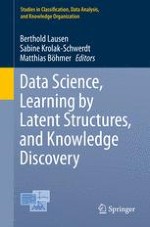2015 | OriginalPaper | Buchkapitel
Psychometric Challenges in Modeling Scientific Problem-Solving Competency: An Item Response Theory Approach
verfasst von : Ronny Scherer
Erschienen in: Data Science, Learning by Latent Structures, and Knowledge Discovery
Verlag: Springer Berlin Heidelberg
Aktivieren Sie unsere intelligente Suche, um passende Fachinhalte oder Patente zu finden.
Wählen Sie Textabschnitte aus um mit Künstlicher Intelligenz passenden Patente zu finden. powered by
Markieren Sie Textabschnitte, um KI-gestützt weitere passende Inhalte zu finden. powered by
